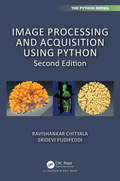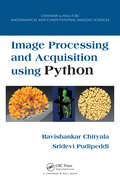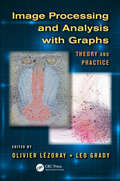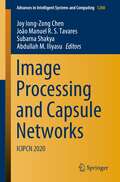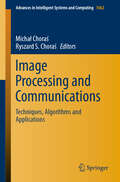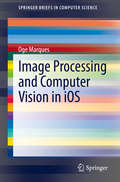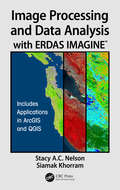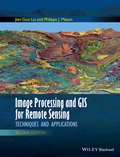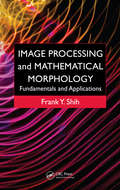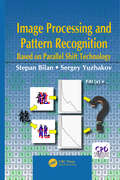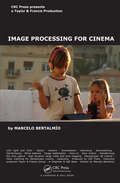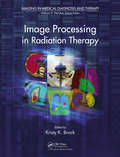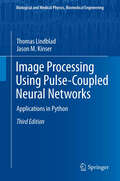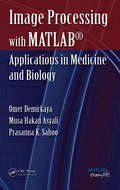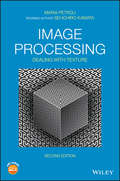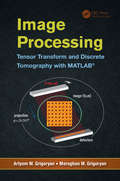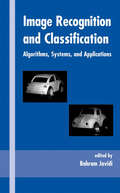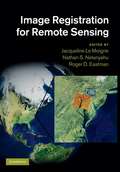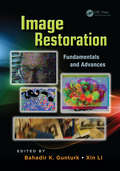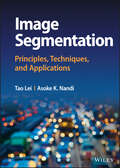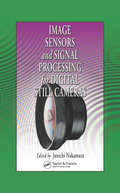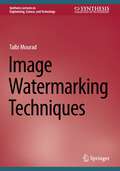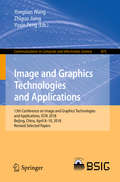- Table View
- List View
Image Processing and Acquisition using Python (Chapman & Hall/CRC The Python Series)
by Ravishankar Chityala Sridevi PudipeddiImage Processing and Acquisition using Python provides readers with a sound foundation in both image acquisition and image processing—one of the first books to integrate these topics together. By improving readers’ knowledge of image acquisition techniques and corresponding image processing, the book will help them perform experiments more effectively and cost efficiently as well as analyze and measure more accurately. Long recognized as one of the easiest languages for non-programmers to learn, Python is used in a variety of practical examples. A refresher for more experienced readers, the first part of the book presents an introduction to Python, Python modules, reading and writing images using Python, and an introduction to images. The second part discusses the basics of image processing, including pre/post processing using filters, segmentation, morphological operations, and measurements. The second part describes image acquisition using various modalities, such as x-ray, CT, MRI, light microscopy, and electron microscopy. These modalities encompass most of the common image acquisition methods currently used by researchers in academia and industry. Features Covers both the physical methods of obtaining images and the analytical processing methods required to understand the science behind the images. Contains many examples, detailed derivations, and working Python examples of the techniques. Offers practical tips on image acquisition and processing. Includes numerous exercises to test the reader’s skills in Python programming and image processing, with solutions to selected problems, example programs, and images available on the book’s web page. New to this edition Machine learning has become an indispensable part of image processing and computer vision, so in this new edition two new chapters are included: one on neural networks and the other on convolutional neural networks. A new chapter on affine transform and many new algorithms. Updated Python code aligned to the latest version of modules.
Image Processing and Acquisition using Python (Chapman And Hall/crc Mathematical And Computational Imaging Sciences Ser.)
by Ravishankar Chityala Sridevi PudipeddiImage Processing and Acquisition using Python provides readers with a sound foundation in both image acquisition and image processing-one of the first books to integrate these topics together. By improving readers' knowledge of image acquisition techniques and corresponding image processing, the book will help them perform experiments more effectiv
Image Processing and Analysis with Graphs: Theory and Practice (Digital Imaging and Computer Vision #5)
by OLIVER LÉZORAY AND LEO GRADYCovering the theoretical aspects of image processing and analysis through the use of graphs in the representation and analysis of objects, Image Processing and Analysis with Graphs: Theory and Practice also demonstrates how these concepts are indispensible for the design of cutting-edge solutions for real-world applications. Explores new applications in computational photography, image and video processing, computer graphics, recognition, medical and biomedical imaging With the explosive growth in image production, in everything from digital photographs to medical scans, there has been a drastic increase in the number of applications based on digital images. This book explores how graphs—which are suitable to represent any discrete data by modeling neighborhood relationships—have emerged as the perfect unified tool to represent, process, and analyze images. It also explains why graphs are ideal for defining graph-theoretical algorithms that enable the processing of functions, making it possible to draw on the rich literature of combinatorial optimization to produce highly efficient solutions. Some key subjects covered in the book include: Definition of graph-theoretical algorithms that enable denoising and image enhancement Energy minimization and modeling of pixel-labeling problems with graph cuts and Markov Random Fields Image processing with graphs: targeted segmentation, partial differential equations, mathematical morphology, and wavelets Analysis of the similarity between objects with graph matching Adaptation and use of graph-theoretical algorithms for specific imaging applications in computational photography, computer vision, and medical and biomedical imaging Use of graphs has become very influential in computer science and has led to many applications in denoising, enhancement, restoration, and object extraction. Accounting for the wide variety of problems being solved with graphs in image processing and computer vision, this book is a contributed volume of chapters written by renowned experts who address specific techniques or applications. This state-of-the-art overview provides application examples that illustrate practical application of theoretical algorithms. Useful as a support for graduate courses in image processing and computer vision, it is also perfect as a reference for practicing engineers working on development and implementation of image processing and analysis algorithms.
Image Processing and Capsule Networks: ICIPCN 2020 (Advances in Intelligent Systems and Computing #1200)
by João Manuel R. S. Tavares Joy Iong-Zong Chen Subarna Shakya Abdullah M. IliyasuThis book emphasizes the emerging building block of image processing domain, which is known as capsule networks for performing deep image recognition and processing for next-generation imaging science. Recent years have witnessed the continuous development of technologies and methodologies related to image processing, analysis and 3D modeling which have been implemented in the field of computer and image vision. The significant development of these technologies has led to an efficient solution called capsule networks [CapsNet] to solve the intricate challenges in recognizing complex image poses, visual tasks, and object deformation. Moreover, the breakneck growth of computation complexities and computing efficiency has initiated the significant developments of the effective and sophisticated capsule network algorithms and artificial intelligence [AI] tools into existence. The main contribution of this book is to explain and summarize the significant state-of-the-art research advances in the areas of capsule network [CapsNet] algorithms and architectures with real-time implications in the areas of image detection, remote sensing, biomedical image analysis, computer communications, machine vision, Internet of things, and data analytics techniques.
Image Processing and Communications: Techniques, Algorithms and Applications (Advances in Intelligent Systems and Computing #1062)
by Ryszard S. Choraś Michał ChoraśThis book presents a selection of high-quality peer-reviewed research papers on various aspects of computer science and networks. It not only discusses emerging applications of currently available solutions, but also outlines potential future techniques and lines of research in pattern recognition, image processing and communications. Given its scope, the book will be of considerable interest to researchers, students and practitioners alike. All papers gathered here were presented at the Image Processing and Communications Conference, held in Bydgoszcz, Poland on September 11–13, 2019.
Image Processing and Computer Vision in iOS (SpringerBriefs in Computer Science)
by Oge MarquesThis book presents the fundamentals of mobile visual computing in iOS development and provides directions for developers and researchers interested in developing iOS applications with image processing and computer vision capabilities. Presenting a technical overview of some of the tools, languages, libraries, frameworks, and APIs currently available for developing iOS applications Image Processing and Computer Vision in iOS reveals the rich capabilities in image processing and computer vision. Its main goal is to provide a road map to what is currently available, and a path to successfully tackle this rather complex but highly rewarding task.
Image Processing and Data Analysis with ERDAS IMAGINE®
by Siamak Khorram Stacy A.C. NelsonRemotely sensed data, in the form of digital images captured from spaceborne and airborne platforms, provide a rich analytical and observational source of information about the current status, as well as changes occurring in, on, and around the Earth’s surface. The data products, or simply images processed from these platforms, provide an additional advantage in that geographic areas or regions of interest can be revisited on a regular cycle. This revisit cycle allows geospatial analysts and natural resource managers to explore changing conditions over time. Image Processing and Data Analysis with ERDAS IMAGINE® explains the principles behind the processing of remotely sensed data in a simple, easy to understand, and "how-to" format. Organized as a step-by-step guide with exercises adapted from original research and using publicly available imagery, such as NASA Landsat, ESA Sentinel-2, Orthophotos, and others, this book gives readers the ability to quickly gain the practical experience needed to navigate the ERDAS IMAGINE® software as well as learn certain applications in Esri’s ArcMap ArcGIS for Desktop software and Quantum the GIS (QGIS) open source applications package. It also helps readers to easily move beyond the information presented in this book and tackle more advanced skills. Written by two professors with long experience in remote sensing and image processing, this book is a useful guide and reference for both undergraduate and graduate students, researchers, instructors, managers, and agency professionals who are involved in the study of Earth systems and the environment.
Image Processing and GIS for Remote Sensing: Techniques and Applications
by Jian Guo Liu Philippa J. MasonFollowing the successful publication of the 1st edition in 2009, the 2nd edition maintains its aim to provide an application-driven package of essential techniques in image processing and GIS, together with case studies for demonstration and guidance in remote sensing applications. The book therefore has a “3 in 1” structure which pinpoints the intersection between these three individual disciplines and successfully draws them together in a balanced and comprehensive manner. The book conveys in-depth knowledge of image processing and GIS techniques in an accessible and comprehensive manner, with clear explanations and conceptual illustrations used throughout to enhance student learning. The understanding of key concepts is always emphasised with minimal assumption of prior mathematical experience. The book is heavily based on the authors’ own research. Many of the author-designed image processing techniques are popular around the world. For instance, the SFIM technique has long been adopted by ASTRIUM for mass-production of their standard “Pan-sharpen” imagery data. The new edition also includes a completely new chapter on subpixel technology and new case studies, based on their recent research.
Image Processing and Mathematical Morphology: Fundamentals and Applications
by Frank Y. ShihIn the development of digital multimedia, the importance and impact of image processing and mathematical morphology are well documented in areas ranging from automated vision detection and inspection to object recognition, image analysis and pattern recognition. Those working in these ever-evolving fields require a solid grasp of basic fundamentals, theory, and related applications—and few books can provide the unique tools for learning contained in this text. Image Processing and Mathematical Morphology: Fundamentals and Applications is a comprehensive, wide-ranging overview of morphological mechanisms and techniques and their relation to image processing. More than merely a tutorial on vital technical information, the book places this knowledge into a theoretical framework. This helps readers analyze key principles and architectures and then use the author’s novel ideas on implementation of advanced algorithms to formulate a practical and detailed plan to develop and foster their own ideas. The book: Presents the history and state-of-the-art techniques related to image morphological processing, with numerous practical examples Gives readers a clear tutorial on complex technology and other tools that rely on their intuition for a clear understanding of the subject Includes an updated bibliography and useful graphs and illustrations Examines several new algorithms in great detail so that readers can adapt them to derive their own solution approaches This invaluable reference helps readers assess and simplify problems and their essential requirements and complexities, giving them all the necessary data and methodology to master current theoretical developments and applications, as well as create new ones.
Image Processing and Pattern Recognition Based on Parallel Shift Technology
by Stepan Bilan Sergey YuzhakovThis book describes the methods and algorithms for image pre-processing and recognition. These methods are based on a parallel shift technology of the imaging copy, as well as simple mathematical operations to allow the generation of a minimum set of features to describe and recognize the image. This book also describes the theoretical foundations of parallel shift technology and pattern recognition. Based on these methods and theories, this book is intended to help researchers with artificial intelligence systems design, robotics, and developing software and hardware applications.
Image Processing for Cinema (Chapman & Hall/CRC Mathematical and Computational Imaging Sciences Series)
by Marcelo BertalmioImage Processing for Cinema presents a detailed overview of image processing techniques that are used in practice in digital cinema. The book shows how image processing has become ubiquitous in movie-making, from shooting to exhibition. It covers all the ways in which image processing algorithms are used to enhance, restore, adapt, and convert movi
Image Processing in Radiation Therapy (Imaging in Medical Diagnosis and Therapy)
by Kristy K. BrockImages from CT, MRI, PET, and other medical instrumentation have become central to the radiotherapy process in the past two decades, thus requiring medical physicists, clinicians, dosimetrists, radiation therapists, and trainees to integrate and segment these images efficiently and accurately in a clinical environment. Image Processing in Radiation
Image Processing using Pulse-Coupled Neural Networks: Applications in Python
by Thomas Lindblad Jason M. KinserImage processing algorithms based on the mammalian visual cortex are powerful tools for extraction information and manipulating images. This book reviews the neural theory and translates them into digital models. Applications are given in areas of image recognition, foveation, image fusion and information extraction. The third edition reflects renewed international interest in pulse image processing with updated sections presenting several newly developed applications. This edition also introduces a suite of Python scripts that assist readers in replicating results presented in the text and to further develop their own applications.
Image Processing with Cellular Topology
by Vladimir KovalevskyThis book explains why the finite topological space known as abstract cell complex is important for successful image processing and presents image processing methods based on abstract cell complex, especially for tracing and encoding of boundaries of homogeneous regions. Many examples are provided in the book, some teach you how to trace and encode boundaries in binary, indexed and colour images. Other examples explain how to encode a boundary as a sequence of straight-line segments which is important for shape recognition. A new method of edge detection in two- and three-dimensional images is suggested. Also, a discussion problem is included in the book: A derivative is defined as the limit of the relation of the increment of the function to the increment of the argument as the latter tends to zero. Is it not better to estimate derivatives as the relation of the increment of the function to the optimal increment of the argument instead of taking exceedingly small increment which leads to errors? This book addresses all above questions and provide the answers.
Image Processing with MATLAB: Applications in Medicine and Biology
by Omer Demirkaya Musa H. Asyali Prasanna K. SahooImage Processing with MATLAB: Applications in Medicine and Biology explains complex, theory-laden topics in image processing through examples and MATLAB algorithms. It describes classical as well emerging areas in image processing and analysis. Providing many unique MATLAB codes and functions throughout, the book covers the theory of probability an
Image Processing: Dealing with Texture
by Maria M. Petrou Sei-ichiro KamataThe classic text that covers practical image processing methods and theory for image texture analysis, updated second edition The revised second edition of Image Processing: Dealing with Textures updates the classic work on texture analysis theory and methods without abandoning the foundational essentials of this landmark work. Like the first, the new edition offers an analysis of texture in digital images that are essential to a diverse range of applications such as: robotics, defense, medicine and the geo-sciences. Designed to easily locate information on specific problems, the text is structured around a series of helpful questions and answers. Updated to include the most recent developments in the field, many chapters have been completely revised including: Fractals and Multifractals, Image Statistics, Texture Repair, Local Phase Features, Dual Tree Complex Wavelet Transform, Ridgelets and Curvelets and Deep Texture Features. The book takes a two-level mathematical approach: light math is covered in the main level of the book, with harder math identified in separate boxes. This important text: Contains an update of the classic advanced text that reviews practical image processing methods and theory for image texture analysis Puts the focus exclusively on an in-depth exploration of texture Contains a companion website with exercises and algorithms Includes examples that are fully worked to enhance the learning experience Written for students and researchers of image processing, the second edition of Image Processing has been revised and updated to incorporate the foundational information on the topic and information on the latest advances.
Image Processing: Tensor Transform and Discrete Tomography with MATLAB ®
by Artyom M. Grigoryan Merughan M. GrigoryanFocusing on mathematical methods in computer tomography, Image Processing: Tensor Transform and Discrete Tomography with MATLAB® introduces novel approaches to help in solving the problem of image reconstruction on the Cartesian lattice. Specifically, it discusses methods of image processing along parallel rays to more quickly and accurately reconstruct images from a finite number of projections, thereby avoiding overradiation of the body during a computed tomography (CT) scan. The book presents several new ideas, concepts, and methods, many of which have not been published elsewhere. New concepts include methods of transferring the geometry of rays from the plane to the Cartesian lattice, the point map of projections, the particle and its field function, and the statistical model of averaging. The authors supply numerous examples, MATLAB®-based programs, end-of-chapter problems, and experimental results of implementation. The main approach for image reconstruction proposed by the authors differs from existing methods of back-projection, iterative reconstruction, and Fourier and Radon filtering. In this book, the authors explain how to process each projection by a system of linear equations, or linear convolutions, to calculate the corresponding part of the 2-D tensor or paired transform of the discrete image. They then describe how to calculate the inverse transform to obtain the reconstruction. The proposed models for image reconstruction from projections are simple and result in more accurate reconstructions. Introducing a new theory and methods of image reconstruction, this book provides a solid grounding for those interested in further research and in obtaining new results. It encourages readers to develop effective applications of these methods in CT.
Image Recognition and Classification: Algorithms, Systems, and Applications (Optical Science and Engineering)
by Bahram Javidi"Details the latest image processing algorithms and imaging systems for image recognition with diverse applications to the military; the transportation, aerospace, information security, and biomedical industries; radar systems; and image tracking systems."
Image Registration for Remote Sensing
by Jacqueline Le Moigne Nathan S. Netanyahu Roger D. EastmanImage registration employs digital image processing in order to bring two or more digital images into precise alignment for analysis and comparison. Accurate registration algorithms are essential for creating mosaics of satellite images and tracking changes on the planet's surface over time. Bringing together invited contributions from 36 distinguished researchers, the book presents a detailed overview of current research and practice in the application of image registration to remote sensing imagery. Chapters cover the problem definition, theoretical issues in accuracy and efficiency, fundamental algorithms, and real-world case studies of image registration software applied to imagery from operational satellite systems. This book provides a comprehensive and practical overview for Earth and space scientists, presents image processing researchers with a summary of current research, and can be used for specialised graduate courses.
Image Restoration: Fundamentals and Advances (Digital Imaging and Computer Vision #7)
by Xin Li Bahadir K. GunturkImage Restoration: Fundamentals and Advances responds to the need to update most existing references on the subject, many of which were published decades ago. Providing a broad overview of image restoration, this book explores breakthroughs in related algorithm development and their role in supporting real-world applications associated with various scientific and engineering fields. These include astronomical imaging, photo editing, and medical imaging, to name just a few. The book examines how such advances can also lead to novel insights into the fundamental properties of image sources. Addressing the many advances in imaging, computing, and communications technologies, this reference strikes just the right balance of coverage between core fundamental principles and the latest developments in this area. Its content was designed based on the idea that the reproducibility of published works on algorithms makes it easier for researchers to build on each other’s work, which often benefits the vitality of the technical community as a whole. For that reason, this book is as experimentally reproducible as possible. Topics covered include: Image denoising and deblurring Different image restoration methods and recent advances such as nonlocality and sparsity Blind restoration under space-varying blur Super-resolution restoration Learning-based methods Multi-spectral and color image restoration New possibilities using hybrid imaging systems Many existing references are scattered throughout the literature, and there is a significant gap between the cutting edge in image restoration and what we can learn from standard image processing textbooks. To fill that need but avoid a rehash of the many fine existing books on this subject, this reference focuses on algorithms rather than theories or applications. Giving readers access to a large amount of downloadable source code, the book illustrates fundamental techniques, key ideas developed over the years, and the state of the art in image restoration. It is a valuable resource for readers at all levels of understanding.
Image Segmentation: Principles, Techniques, and Applications
by Asoke K. Nandi Tao LeiImage Segmentation Summarizes and improves new theory, methods, and applications of current image segmentation approaches, written by leaders in the field The process of image segmentation divides an image into different regions based on the characteristics of pixels, resulting in a simplified image that can be more efficiently analyzed. Image segmentation has wide applications in numerous fields ranging from industry detection and bio-medicine to intelligent transportation and architecture. Image Segmentation: Principles, Techniques, and Applications is an up-to-date collection of recent techniques and methods devoted to the field of computer vision. Covering fundamental concepts, new theories and approaches, and a variety of practical applications including medical imaging, remote sensing, fuzzy clustering, and watershed transform. In-depth chapters present innovative methods developed by the authors—such as convolutional neural networks, graph convolutional networks, deformable convolution, and model compression—to assist graduate students and researchers apply and improve image segmentation in their work. Describes basic principles of image segmentation and related mathematical methods such as clustering, neural networks, and mathematical morphology. Introduces new methods for achieving rapid and accurate image segmentation based on classic image processing and machine learning theory. Presents techniques for improved convolutional neural networks for scene segmentation, object recognition, and change detection, etc. Highlights the effect of image segmentation in various application scenarios such as traffic image analysis, medical image analysis, remote sensing applications, and material analysis, etc. Image Segmentation: Principles, Techniques, and Applications is an essential resource for undergraduate and graduate courses such as image and video processing, computer vision, and digital signal processing, as well as researchers working in computer vision and image analysis looking to improve their techniques and methods.
Image Sensors and Signal Processing for Digital Still Cameras (Optical Science and Engineering)
by Junichi NakamuraShrinking pixel sizes along with improvements in image sensors, optics, and electronics have elevated DSCs to levels of performance that match, and have the potential to surpass, that of silver-halide film cameras. Image Sensors and Signal Processing for Digital Still Cameras captures the current state of DSC image acquisition and signal processing technology and takes an all-inclusive look at the field, from the history of DSCs to future possibilities.The first chapter outlines the evolution of DSCs, their basic structure, and their major application classes. The next few chapters discuss high-quality optics that meet the requirements of better image sensors, the basic functions and performance parameters of image sensors, and detailed discussions of both CCD and CMOS image sensors. The book then discusses how color theory affects the uses of DSCs, presents basic image processing and camera control algorithms and examples of advanced image processing algorithms, explores the architecture and required performance of signal processing engines, and explains how to evaluate image quality for each component described. The book closes with a look at future technologies and the challenges that must be overcome to realize them.With contributions from many active DSC experts, Image Sensors and Image Processing for Digital Still Cameras offers unparalleled real-world coverage and opens wide the door for future innovation.
Image Super-Resolution and Applications
by Fathi E. El-Samie Mohiy M. Hadhoud Said E. El-KhamyThis book is devoted to the issue of image super-resolution-obtaining high-resolution images from single or multiple low-resolution images. Although there are numerous algorithms available for image interpolation and super-resolution, there's been a need for a book that establishes a common thread between the two processes. Filling this need, Image
Image Watermarking Techniques (Synthesis Lectures on Engineering, Science, and Technology)
by Talbi MouradThis book investigates the image watermarking domain, analyzing and comparing image watermarking techniques that exist in current literature. The author’s goal is to aid researchers and students in their studies in the vast and important domain of image watermarking, including its advantages and risks. The book has three chapters: image watermarking using data compression; speech modulation for image watermarking; and secure image watermarking based on LWT and SVD.In addition, this book: Investigates the image watermarking domain, analyzing and comparing current image watermarking techniquesIncludes detail on image encryption and mathematical tools used for image watermarkingCovers image watermarking using data compression, speech modulation for image watermarking, and more
Image and Graphics Technologies and Applications: 13th Conference On Image And Graphics Technologies And Applications, Igta 2018, Beijing, China, April 8-10, 2018, Revised Selected Papers (Communications In Computer And Information Science #875)
by Yongtian Wang Zhiguo Jiang Yuxin PengThis book constitutes the refereed proceedings of the 13th Chinese Conference on Image and Graphics Technologies and Applications, IGTA 2018, held in Beijing, China in April, 2018. The 64 papers presented were carefully reviewed and selected from 138 submissions. They provide a forum for sharing progresses in the areas of image processing technology; image analysis and understanding; computer vision and pattern recognition; big data mining, computer graphics and VR; as well as image technology applications.
